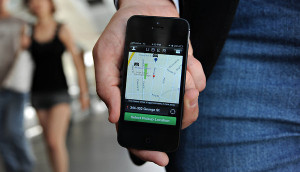Today’s post comes from guest blogger Caroline Lewis, Brand Strategy Intern at Addison Whitney
In the next 24 hours, nearly 1 million people around the globe will get in a stranger’s personal car using Uber. Over 800,000 will rent accommodations from private individuals with the help of Airbnb. Another 10,000 will lease a place for their pets to stay in someone’s home through DogVacay, and 10,000 more will hand their car keys over to an unfamiliar person using the car-sharing service, RelayRides.
Facilitated by smart phones and the internet, trusting consumers and the companies they use are considered part of the rapidly-growing “share economy,” which offers individuals the ability to exchange resources in a manner that would have been considered foolhardy just a few years ago.
The big question is: why are people placing so much trust in strangers?
This shift in consumer behavior is not caused by a business model trend, but a transformation of our society in the digital age. The economic effects of the global financial crisis of the 2000s have collided with the rise of social media, creating a culture in which we are not only driven by a desire to capitalize on unused resources, but also more open to the idea of sharing, even with complete strangers. This change has fueled an industry in which transactions rely on mutual trust and the exchanging of resources in a manner that benefits the common good.
The success of the share economy lies in how its brands cultivate trust. These brands focus their efforts on making consumers feel that they are interacting with people they can get to know, even if it is through the relative anonymity of the Internet.
Customer comments and ratings dominate web pages, creating atmospheres of credibility and trust between consumers and the brands. Many companies, such as Lyft (a transportation service similar to Uber), Airbnb, and RelayRides, recommend that users offering services connect their accounts to social media. Social media profiles reflect, at least in part, our real identities, and are therefore instrumental in building a more human persona, a strength for any brand.
The result has not only catapulted brands in the share economy space to booming success, but also changed the way that we view the strangers we interact with. Consumers are aware that they are  collaborating with real, individual people, creating a connection between brand, representative, and consumer unique to the share economy.
collaborating with real, individual people, creating a connection between brand, representative, and consumer unique to the share economy.
An Uber driver differs very little from a taxi driver in that both arrive to simply transport you to your destination. However, Uber’s consumers generally report feeling safer and more comfortable, and they are more likely to talk with drivers and sit in the front seat (or dance and sing with the driver, as seen here). With RelayRides, renters must meet the car owner to receive their keys. When RelayRides implemented this policy, satisfaction increased 40%, and users were more likely to keep the cars clean and return them on time. Interactions are between familiar faces, not complete strangers, and are beneficial to the brands, companies and individuals involved.
What does this mean for your brand?
Big or small, trust is essential. Consumers and customers are looking for innovative ways to get things done and want to trust the source – we see it in the share economy business trend, garden-to-table food trend, and home-schooling education trend. Build trust with your audience. Share feedback openly, let consumers get to know your brand ambassadors, salespeople, and customer service representatives in a real way. Let consumers be a part of the brand.
Image sources:
https://www.nytimes.com/2012/12/03/technology/app-maker-uber-hits-regulatory-snarl.html?_r=0
https://www.foxnews.com/travel/2015/04/22/10-things-need-to-know-about-airbnb-before-book/
Addison Whitney is a global branding firm with a passion for building strong brands.
To learn more about Addison Whitney, visit our website at AddisonWhitney.com, or contact us here.
